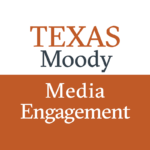
In its most recent survey, funded in part by the Center for Media Engagement, the Digital Media Research Program in the Moody College of Communication sought to gain a more in-depth understanding of communication technology’s impact on political knowledge and participation.
KEY FINDINGS
Exposure to fake news serves as a bridge between political participation and fake news sharing
Politically engaged people tended to more actively and frequently navigate the political landscape and seek out information. This process led to more frequent exposure to information, including false information, and in turn, increased the likelihood that fake news would be shared. We also found that the strength of a person’s partisanship amplified the relationship between political participation and exposure to fake news.
Perception of errors made in the news negatively affects levels of trust
In investigating the relationships between perceived news quality, media trust, and audience ideology, we found that the most commonly perceived errors in the news were 1) sensationalized or understated stories, 2) stories missing essential information, and 3) inaccurate headlines. These three types of errors negatively affected people’s trust in media. Ideology also played a significant role, with people who reported higher levels of social and economic conservatism having higher perceptions of errors. The study also found that the least frequently perceived error types were factual errors and misspellings or poor grammar.1
People who follow or interact with journalists on Twitter are more likely to trust the news media than are other Internet users
We examined the relationship between Twitter engagement with journalists and levels of general media trust and found that Twitter users who follow or interact with journalists (e.g., like, retweet, reply) had significantly higher trust levels than other online users. However, we expected that people in reciprocal relationships with journalists – when the journalists were following them back – would have even higher levels of trust. This was not the case. Our results point to the value of audiences watching journalists publicly perform their profession via social media while showing that reciprocal actions are not necessarily needed in order to impact media trust levels.
American news audiences greatly value context in reporting
As members of the public lose trust and interest in the media, some outlets are turning to forms of reporting like constructive/solutions journalism to provide greater context to news consumers. Our survey showed that the American public values such reporting, and even places its functions above many of the others traditionally assigned to journalism, such as serving as a watchdog. Further, people’s perceptions of a journalist’s role were a better indicator their trust in media than were standard indicators of trust such as ideology.
People perceive others to be more negatively affected by social media content than they perceive themselves to be
Our findings show that people believed others to be more negatively affected by social media content than they themselves were, with significant effects according to age, level of education, and general attitudes towards censorship. We also found that the more people supported platform regulation, the more they thought the platforms negatively affected themselves and others. Further, the frequency of social media use had a negative effect on support for government regulation of platforms. The results point to the need for greater nuance in considering how platforms are regulated.2
METHODOLOGY
The 82-question, two-wave survey took nearly six months to develop. After applying quality control filters to remove bots and incomplete surveys, our first wave consisted of 1,026 respondents. We worked with survey panel company Dynata to create quotas to ensure that the study was nationally representative according to U.S. Census demographic categories for age, gender, and race. We were successful in every category except for Hispanic representation; thus any studies using this variable were weighted accordingly. Data collection for the second wave of the survey wrapped in October 2019. With 476 returning participants, we had a 46% response rate. Research based on this project will continue in the fall of 2020, but the survey has already produced a number of studies that have been presented at mass communication conferences.
ACKNOWLEDGEMENTS
Studies were completed by journalism doctoral students Ivy Ashe, Emily Goldstein, Gyo Hyun Koo, Taeyoung Lee, Martin Riedl, Christian Staal Bruun Overgaard, Ryan Wallace, Tamar Wilner, professor Tom Johnson, visiting associate professor Ivan Lacasa–Mas, and alumni assistant professors Lourdes Cueva Chacón (San Diego State University), Kyser Lough (University of Georgia) and Kelsey Whipple (University of Massachusetts – Amherst).
For more information about DMRP, please visit our website.
- Wilner, T., Wallace, R., Lacasa-Mas, I., & Goldstein, E. (2021). The Tragedy of Errors: Political Ideology, Perceived Journalistic Quality, and Media Trust. Journalism Practice, 1-22.[↩]
- Riedl, M. J., Whipple, K. N., & Wallace, R. (2021). Antecedents of support for social media content moderation and platform regulation: the role of presumed effects on self and others. Information, Communication & Society, 1-18.[↩]



